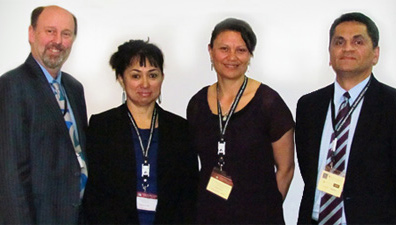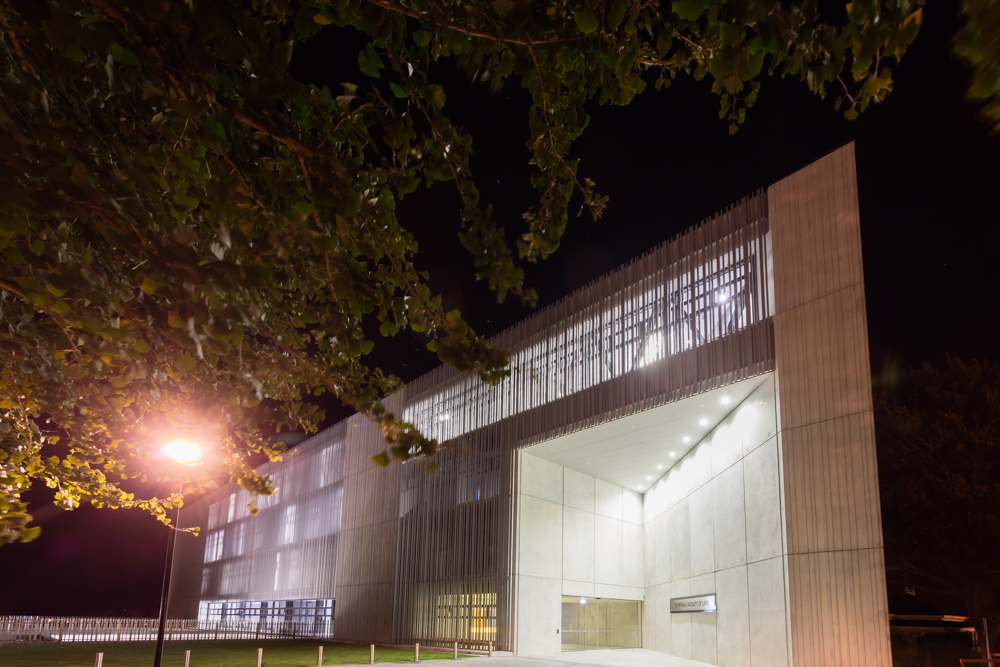The aims of the Māori and Indigenous Governance Centre (MIGC) are to:
- Meet currently unmet demands for cutting edge quality research on Māori governance best practice models
- Build a body of knowledge and wisdom to help improve Māori governance
- Report on Māori governance best practice models, practices and institutions
- Provide practical training for Māori and non-Māori who work in or with Māori governance organisations
- Learn from Indigenous governance experiences globally as well as sharing Māori successes
- Work with Māori to evaluate and report on their current governance effectiveness and enhancement for the future
- Seek collaborative research partnerships with Māori and other key stakeholders on Māori governance;
Our vision is to improve Māori governance generally, whether it concerns Māori trusts and incorporations, asset holding companies, iwi organisations, post-settlement governance entities, marae and hapu committees; and Indigenous peoples' organisations globally. The Centre will engage in collaborative research nationally and internationally by undertaking longitudinal research, in consultation and partnership with profit and non-profit Māori and Indigenous organisations. A sustainable Māori economy (approx $36 billion) demands efficient and culturally appropriate good governance with Māori organisations, hence the importance of the Centre's research.
Faculty Members
 From left: Professor Brad Morse, Valmaine Toki, Linda Te Aho, Dr Robert Joseph (Director).
From left: Professor Brad Morse, Valmaine Toki, Linda Te Aho, Dr Robert Joseph (Director).
Not pictured: Mylene Rakena (Centre Manager), Professor Barry Barton, Joel Manyam, Wayne Rumbles (Dean of Te Piringa - Faculty of Law), Sadeq Bigdeli, Gay Morgan, Doug Tennent, Dr Richard Benton, as well as other scholars from the University of Waikato and other universities.
How we can work with you
Te Mata Hautû Taketake offers research, consultancy and capacity building services. We collaborate with researchers from other universities, Crown Research Institutes, Whare Wânanga, Māori organisations and iwi providers to undertake projects on a “best team” basis to provide cutting edge research on Māori and Indigenous governance, research design advice, mentoring and training and project management.
We will also work to meet the governance research and development aspirations of Mâori communities through:
- project management support
- Masters, Doctoral and researcher career development and support
- tailored courses and workshops
- public seminars
- identifying and defining intellectual property
- brokering relationships to facilitate knowledge transfer and uptake
- matching university expertise
- advisory services concerning Maori and Indigenous people' governance
Research and publications
Current Research Areas
- Effective post-Treaty of Waitangi settlement governance models
- Successful Te Ture Whenua Maori land trust and incorporation models
- Appropriate and effective Maori and Indigenous dispute resolution within governance institutions
- Maori and Indigenous co-governance and co-management of natural resources
- Indigenous governance in Australia, North America and the Pacific
MIGC Publications
-
Te Pai Tawhiti - Exploring the Horizons of Māori Economic Performance through Effective Collaboration
-
Te Mata Ira - Guidelines for Genomic Research with Māori
-
He Tangata Kei Tua - Guidelines for Biobanking with Māori
-
Indigenous Governance Programs in America & New Zealand - A literature review by Dr Torivio A. Fodder for Te Mata Hautū Taketake – The Māori & Indigenous Governance Centre (MIGC).
-
Ka Takahia ano o tatou Tapuae: Retracing Our Steps - A Māori Governance Overview and Literature Review - A literature review by Dr Torivio A. Fodder, Dr Robert Joseph and Priscilla Davis-Ngatai for Te Mata Hautū Taketake – The Māori & Indigenous Governance Centre (MIGC).
The following may be purchased via email to LawPublications@waikato.ac.nz
MIGC Literature Review 2014
Domestic purchase – $25.00
Indigenous governance programs in America & New Zealand
Domestic Purchase - $25.00
International Purchase - $30.00
MIGC News
November 2014
The aim of this Symposium is to identify legal principles for the governance of public goods based on the notion of Responsibility, such as Trusteeship, Guardianship, Kaitiakitanga. A proposal for the governance of water by Sir Eddie Taihakurei Durie will provide a specific case study example. Considerations will be expanded for stewardship of global commons and climate commitments for COP21. Prospects for research and strategic implementation will be identified.
See the Law Ethics and Responsibility flyer (PDF)
Symposium Abstracts
- Charter of Human Responsibilities
- Ki a Te Rangikaheke raua ko Pirihira by Eddie Taihakurei Durie
- Final Responsibility Symposium Handbook
- Ka Huli Ao - Building Pono Water Management in Hawai'i Nei
- Responsibility Matters: A Perspective for Public Good
- Taking Responsibility Seriously by Pierre Calame
- Property Rights and Sustainability Toward a New Vision of Property by Prue Taylor and David Grinlinton
October 2013
Te Mata Hautu Taketake - the Maori and Indigenous Governance Centre will conduct a nationwide research study aimed at better assessing the governance capacities and training needs of Maori entities across Aotearoa – New Zealand. This research study will be led by Dr Robert Joseph with Dr Torivio Fodder as associate investigator and Renee Rewi as Centre Manager.
Download the Nationwide Māori Governance Survey
Sharon's research is to interrogate practical solutions and strategies for iwi to engage in a global political and market economy while retaining and valuing our own very unique identities, values and tikanga. She is looking beyond land use potential for Māori own land and even economic sustainable development, toward the potential for setting a Māori and indigenous governance framework that effectively deals with neoliberalism. An important focus of her research will be to look at the inclusion of Māori women in Māori organisational structures and governance roles
February 2013
Ko Whakatere te maunga, Waimā Tuhirangi te whenua, Hokianga-o-Kupe te moana, Ko Māhurehure te hapu, Ko Ngāpuhi te iwi, Ko Sharon Toi tōku ingoa. Tihei Mauriora.
Sharon's research is to interrogate practical solutions and strategies for iwi to engage in a global political and market economy while retaining and valuing our own very unique identities, values and tikanga. She is looking beyond land use potential for Māori own land and even economic sustainable development, toward the potential for setting a Māori and indigenous governance framework that effectively deals with neoliberalism. An important focus of her research will be to look at the inclusion of Māori women in Māori organisational structures and governance roles.
February 2013
Rangimarie is of Ngati Rangiwewehi, Ngati Whakaue, Ngati Ranginui and Te Rarawa descent. With an interdisciplinary background spanning the fields of Education and the Law Rangimarie has specific research interests in indigenous research theories and methodologies, the revitalization and maintenance of indigenous knowledge’s and identities and more recently the exploration of indigenous governance approaches and pathways towards greater levels of self-determination for indigenous peoples through their governance arrangements. Rangimarie’s doctoral research focuses more specifically on the conceptions and practices of governance that have developed within Ngati Rangiwewehi. The study forms part of an overall governance review taking place in conjunction with Ngati Rangiwewehi’s transition into our post-settlement governance arrangements. The central question of the thesis asks how Ngati Rangiwewehi might ensure that they are self-determining through their post-settlement governance arrangements.
February 2013
Te Mata Hautū Taketake has the pleasure to announce the arrival of Dr Torivio Fodder. Dr Fodder is a recent SJD graduate of the Indigenous People's Law and Policy Program at the University of Arizona, James E. Rogers College of Law. Under the supervision of renowned indigenous rights scholar, Prof Robert A. Williams, Dr Fodder's dissertation developed a new framework for the articulation of indigenous rights and self-determination drawing from the disparate fields of critical race theory and libertarian philosophy.
Originally from Walters, Oklahoma, USA, Torivio is an enrolled member of the Taos Pueblo and of Comanche, Kiowa and Cherokee tribal descent
Over the next six months Dr Fodder will undertake research and maintain current knowledge relating to Indigenous Governance and Dispute Resolution. He will also assess effectiveness of internal governance mechanisms of Māori and other Indigenous for profit and non-profit Indigenous legal entities and trusts.
The University of Waikato’s newly established Te Mata Hautu Taketake – the Centre for Maori and Indigenous Governance – has joined government and private sector organisations on a working panel to ensure optimum value is gained from Maori assets.
November 2012
The Maori and Indigenous Governance Centre has been established to fill a gap by providing research-led solutions that are practical, effective and culturally relevant for improving governance and leadership among Maori organisations. The Centre will research and identify robust indigenous governance and leadership models, facilitate a network of commercial partner organisations that can explore opportunities of mutual benefit, assist organisations to optimize their governance arrangements, and provide practical assistance for Maori organisations through workshops, symposia, training and advisory functions.

Waikato Public Law and Policy Research Unit
The Waikato Public Law and Policy Research Unit promotes the widest conception of Public Law and Policy, encompassing administrative law, charity and the regulation of civil society, constitutional law, criminal law and justice, and international law.

CEREL
The Centre for Environmental, Resources and Energy Law (CEREL) generates research into law and policy that supports efforts to answer the challenges we face locally and worldwide in relation to the environment, natural resources and energy.
Law & Technology Research Hub
ENCRYPT and DECIPHER: Studying the principles, values and impact of encryption in New Zealand.